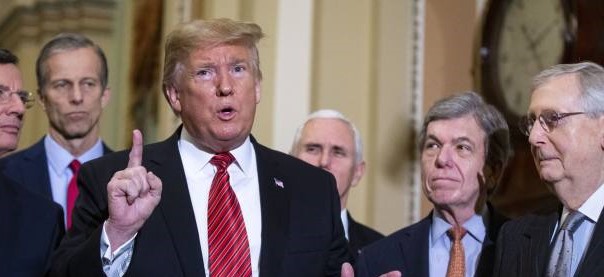Border Wall halts US government
January 12, 2019 | Expert Insights

The Chairman of the Federal Reserve, Jerome Powell has issued a warning about the economic costs of the ongoing government shutdown. President Trump is not backing down from his demand for the border wall funding and is prepared to impose a national emergency to fulfil his campaign promise.
Background
A government shutdown occurs when Congress fails to pass or the President fails to sign appropriations legislation funding federal government operations and agencies. Since 1976, when the current budget and appropriations process was enacted, there have been twenty gaps in budget funding, eight of which led to federal employees being furloughed.
The ongoing shutdown started on 22 December 2018 after the Democrats refused to include funds for President Trump’s border in the continuing resolution to pay for the operations of the Federal Government.
Throughout his 2016 presidential campaign, Donald Trump called for the construction of a much larger and fortified border wall, claiming that if elected, he would "build the wall and make Mexico pay for it". Some estimates show an $8 to $12 billion cost for such a project, while others find there are enough uncertainties to drive the cost to between $15 and $25 billion.
President Trump has refused to concede his main demand for funding the border wall and even threatened to keep the government shutdown going for “months or even years”. He has alternately threatened to impose a state of national emergency to tackle what he describes as a major humanitarian crisis at the US-Mexico border.
Analysis
Donald Trump insisted he had the “absolute right” to declare a national emergency in order to find funding for his border wall - as the impasse between the US president and congressional Democrats neared the end of its third week. The president insisted he had “various mechanisms” at his disposal to fund his proposed wall as attempts to strike a deal to reopen the government faltered in Congress.
Republican senator Lindsey Graham said during the day that a “congressional path” to funding the border barrier was now virtually closed and that it was time for Mr. Trump to use emergency powers to bypass Capitol Hill and pay for the proposals.
US media reports said that one option being examined by the Trump administration, was to use funds that had been allocated to the US Army Corps of Engineers to deal with the aftermath of fires and storms. Mr. Trump travelled to Texas to reiterate his demands for congressional money for a wall, the key sticking point in talks over the budget.
Declaring a national emergency could trigger a backlash among lawmakers as well as court challenges. But Mr. Trump told reporters: “I have the absolute right to declare a national emergency. The lawyers have so advised me. I'm not prepared to do that yet. But if I have to, I will.”
The president cited the dispute in cancelling a trip to Davos, Switzerland, that was planned for later this month, in a sign of how entrenched the battle over federal funding has become.
The stand-off with Democrats over the wall has put the US on track for what will become its longest-ever government shutdown if it continues through the weekend. During the day Jay Powell, the Federal Reserve chairman, warned that a prolonged shutdown could start taking a toll on the US economy.
Mr. Powell said that past government shutdowns had been fairly shortlived affairs that did not leave much of a mark on the economy. “A longer shutdown is something we haven’t had,” said Mr Powell. “If we had an extended shutdown then I do think that would show up in the data pretty clearly.”
He added that an extended shutdown would also make it harder for the Fed to get a clear view of the economy’s performance since some government agencies that are responsible for key economic indicators have been affected by the closures.
Assessment
Our assessment is that Trump’s threat to impose a state of national emergency is directed towards a Democrat-controlled House which is no longer supportive of his legislative agenda. We believe that suspending essential public services for the purpose of scoring political points or fulfilling campaign promises is not a responsible course of action for a government.








Comments